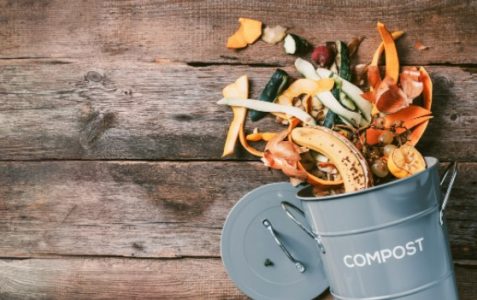Composting has a number of environmental advantages as well as financial savings in waste management. Composting processes are more environmentally friendly when it comes to decreasing landfill waste. It is a waste-to-organic conversion process. Compostable materials include food scraps, papers, garden leaves, and food waste.
Composting is the most effective technique to achieve a zero-waste solution to environmental issues while lowering our carbon footprint. Composting is a good option if you care about the environment. We’ve discussed the environmental advantages of composting in this article.
Why Compost? Here’s How Compost Helps the Environment
Take a moment to consider what you ate for breakfast today. Every delectable taste, from strawberries to extra crispy bacon, can be traced back to the earth. We are literally fed by the dirt! Composting is simply paying it forward.
Compost is a soil-like mixture of decomposing organic matter (in the sense of living organic matter, not farming operations) and a thriving community of microbes that aid in the decomposition process. Garden rubbishes like lawn trimmings, leaf, mulch, grass cuttings, some paperboards, and leftover food such as raw and cooked fruits, vegetables, grains, nutshells, coffee grounds, and even meat and dairy products are also the organic components that makeup compost.

You’d think the method of composting would be just as complicated as its ground-breaking impact. Certainly not!
Composting is a simple and practical technique to help solve today’s environmental, economic, and social problems. Including this easy step in your eco-friendly routine can make a big difference.
Including this easy step in your ecologically friendly routine can go a long way toward reducing greenhouse gas emissions, regenerating soil, renewing water sources, and ensuring future food security.
Have you picked up your pitchfork yet? To understand more, let’s go through a few of the many wonderful advantages of composting.
Environmental Benefits of Composting
Minimizes Landfill Sizes
Organic waste is kept out of landfills by composting. This not only prevents landfills from exceeding their volume capacity too soon, but also reduces pollutants. In landfills, plant and food products do not decompose efficiently.

An anaerobic environment is created by layers of garbage trapping the plant and food waste. Unfortunately, the difference between aerobic and anaerobic composting is enormous.
Due to the lack of oxygen in the landfill, decaying trash produces a high concentration of methane gas. Methane is a potent greenhouse gas with 21 times the potency of CO2.
Enriches soil
One of the most critical components of successful ecosystems is healthy soil. Beneficial microorganisms and mycorrhizal fungi thrive in productive soil, forming a robust network of communication between plants.
This simply means that healthy soil is beneficial to all living things. On the other hand, unhealthy or barren soil is a sign of deteriorating natural processes. Because barren soil can’t store water or nutrients, erosion is more likely, and dry spells are more damaging. Soil erosion is reduced by adding compost, which enhances soil health.
Compost has a number of advantages, including the ability to restore nutrients, bacteria, and other helpful composting organisms into the soil, so mending these systems over time.
Cleaner Oceans
Because all water eventually ends up in the ocean, compost’s ability to filter water as it passes through the ground ensures that the water going into the ocean is cleaner. Acidifying fertilisers and other harsh chemicals used in agriculture are among the most significant polluters of the oceans.

Composting reduces the amount of water run-off that carries toxic chemicals into the ocean, as well as the need for artificial fertilisers and pesticides in the first place.
Minimizes Chemicals
The use of synthetic fertilisers will be reduced if compost is applied to fields.
Compost not only provides fundamental required nutrients such as nitrogen, phosphorous, and potassium that are contained in chemical fertilisers. It also provides a wide spectrum of trace minerals as well as other nutrients not found in synthetic fertilisers to your farmland.
Synthetic fertiliser use should be kept to a minimum to avoid environmental damage and difficulties such as water pollution. Algal blooms in oceans and lakes are caused by nitrogen emissions from chemical fertilisers, dramatically altering and harming the coastal ecology.
Helps Lower Production Costs for Farmers

Who doesn’t want to assist farmers? Farmers and gardeners who utilise compost save money on fertilisers, herbicides, water, and irrigation, allowing them to invest that money in growing their production capacity. Furthermore, it has been demonstrated that fields that use compost produce larger yields than those that do not. There will be more crops to sell and more money to be made as a result of this.
Helps you save on your trash bill
Every day, the average Brit discards 3.4 pounds of garbage. That kind of waste builds up over time, resulting in a higher trash cost. Diverting fruit and vegetable scraps and other biodegradable household goods into composting can considerably reduce the quantity of trash you dispose of on a daily basis, in addition to lowering your overall waste.
Author Profile

- Certified Junk Clearance Professional at Express Waste Removals.
Latest Entries
 House ClearanceNovember 28, 2023How to Dispose of an Electric Kettle?
House ClearanceNovember 28, 2023How to Dispose of an Electric Kettle? Commercial WasteNovember 16, 2023Tips to Reduce Recycling Contamination
Commercial WasteNovember 16, 2023Tips to Reduce Recycling Contamination RecyclingNovember 9, 2023What to Do With Old Cassette Tapes?
RecyclingNovember 9, 2023What to Do With Old Cassette Tapes? House ClearanceOctober 25, 2023What To Do With an Old Router?
House ClearanceOctober 25, 2023What To Do With an Old Router?